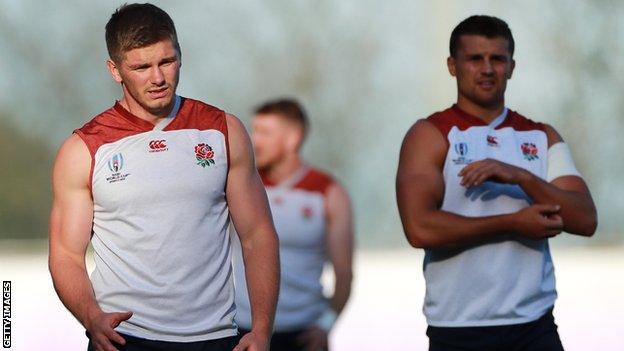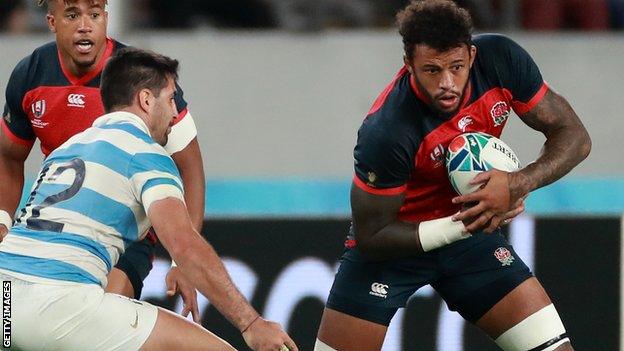Rugby World Cup: England v Australia - George Ford dropped for quarter-final
- Published
- comments

Henry Slade (right) will take Owen Farrell's place in the centre with the England captain moving to fly-half
Rugby World Cup quarter-final: England v Australia |
|---|
Venue: Oita Stadium Date: Saturday, 19 October Kick-off: 08:15 BST |
Coverage: Live commentary on BBC Radio 5 Live and online with text updates on the BBC Sport website and app. |
England have dropped George Ford for their World Cup quarter-final against Australia, with Owen Farrell selected in his place at fly-half.
Ford has started every game at this World Cup and has been among England's most impressive performers.
But head coach Eddie Jones has left out the Leicester playmaker for the biggest game of his four-year regime.
Henry Slade comes in for Farrell - who has played centre in the World Cup to date - to partner Manu Tuilagi.
Both Billy and Mako Vunipola have been declared fit to start, with George Kruis also dropped to the bench and Courtney Lawes starting in his place.
"Australia defend a certain way - we believe these three players can trouble their defence, and defensively we feel like it's a pretty strong 10-12-13 combination," said Jones.
"We know Australia are a high possession team, they are a high phase team and that's how they want to play.
"And so there's going to be a lot of defending in that area, and we think those three guys are well equipped to handle it."
Although the Farrell, Tuilagi and Slade combination was used throughout this year's Six Nations, this still represents a significant gamble from Jones, with the Exeter back having not played more than 40 minutes of rugby since May after a serious knee injury.
For Ford, it is history repeating itself, after previous England coach Stuart Lancaster dropped him for the pool games against Wales and Australia at the 2015 World Cup.
Ford had been a regular starter in the previous two years before that tournament and was the standout performer in an impressive victory in Cardiff in the preceding Six Nations.
The former Bath player has once again impressed in Japan as England have beaten Tonga, the United States and Argentina with some comfort.

Courtney Lawes has been preferred to George Kruis alongside Maro Itoje in the second row
His partnership with Farrell has featured more times since the last Rugby World Cup than any other 10-12 combination in top-tier internationals.
Farrell looked out of sorts against Argentina, missing four consecutive kicks at goal and at periods in the second half looking caught between options as if still stunned by Tomas Lavanini's first-half shoulder charge.
But with the Wallabies likely to pick a heavyweight midfield of 17-stone Samu Kerevi and 19-year-old Jordan Petaia, another big man at more than 15 stones and 6ft 3ins, Jones has changed his play-making strategy.
"They are a clever team - they play good rugby, they've improved their scrum and line-out over the last six to 12 months considerably and that makes them more difficult to beat," said Jones.
"We've had three games, we've had three bonus-point wins, we can't do more than that.
"Do we have to play better than that against Australia? The likelihood is yes, and we are prepared for that."
Jones has stuck with the youthful pairing of Tom Curry and Sam Underhill in the back row to take on the great scavenging breakdown threat of David Pocock and Michael Hooper.
Jonny May wins his 50th cap on the wing, although there is no place even on the bench for Jack Nowell, who has failed to recover from a hamstring injury.
Lewis Ludlam covers the back-row positions on the bench, with Jonathan Joseph the other midfield option alongside Ford among the replacements.
Australia were beaten by Wales in the pool stage and have lost each of their last six matches against England.
But they beat England at Twickenham at the last World Cup en route to making the final, and defeated world champions New Zealand just two months ago.
"Pocock has probably, over the last 10 years, been the foremost number seven in the world," Jones said.
"Hooper is a massively important player for Australia - he's a link player, and takes the ball forward a lot once they get inside the opposition's 22.
"He's obviously a key leader for the team, but our two young boys are just getting better every game.
"Curry has improved his line-out jumping immensely over the last six or eight weeks, Underhill's probably the most combative seven I've seen for a long time. It's just going to be a battle at the breakdown."
England team to play Australia: Daly; Watson, Slade, Tuilagi, May; Farrell (capt), Youngs; M Vunipola, George, Sinckler; Itoje, Lawes; Curry, Underhill, B Vunipola.
Replacements: Cowan-Dickie, Marler, Cole, Kruis, Ludlam, Heinz, Ford, Joseph.
Match stats
England and Australia have met 50 times previously, England have won 24 of those matches with Australia winning 25, a drawn game in 1997 completes the head-to-head record.
England and Australia have played each other six times in the Rugby World Cup, both sides with three wins including a triumph each in the final, Australia beating England in 1991 at Twickenham and England exacted revenge in Sydney in the 2003 final.
England have won their last six Test matches against Australia, their longest winning run against their rivals. However, their last defeat against them came at the 2015 Rugby World Cup.
England averaged 29 kicks in play per game during the pool stage, the most of any team, Australia meanwhile averaged the fewest (13).
Australia's Samu Kerevi beat 20 defenders across three appearances in the pool stage, the most of any centre in the competition and more than England's top two centres combined (Manu Tuilagi nine, Jonathan Joseph eight).
England's Maro Itoje won seven turnovers in the pool stage, the most of any player in the competition, despite playing just two games.
Jonny May will win his 50th cap for England - he is sixth on England's try-scoring list with 25 tries, but only two of those have come in World Cup matches (v Wales in 2015, v Argentina in 2019).
Luke Cowan-Dickie has scored a try in each of his three Rugby World Cup games, only Will Greenwood has scored in more consecutive games at the tournament for England (four in 2003).